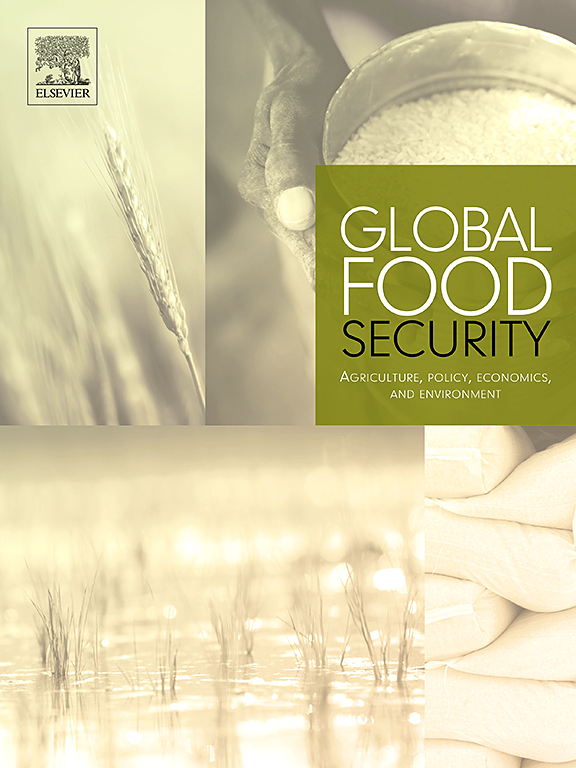提高农业粮食系统中的家庭生计:妇女赋权的作用
IF 9.6
1区 经济学
Q1 FOOD SCIENCE & TECHNOLOGY
Global Food Security-Agriculture Policy Economics and Environment
Pub Date : 2025-04-17
DOI:10.1016/j.gfs.2025.100856
引用次数: 0
摘要
赋予妇女权力不仅对她们的福祉至关重要,而且对整个家庭、社区和经济的福祉也至关重要。缩小农业粮食系统中的性别差距和增强妇女权能,对于实现包括可持续发展目标1、2、5和10在内的一系列广泛目标至关重要。关于妇女在农业和农业粮食系统中赋权的许多文献侧重于其在农业生产、饮食多样性、儿童营养和妇女营养方面的益处。然而,关于妇女赋权对生计和抵御冲击能力相关结果的影响的证据有限,这两个关键因素推动了小规模生产者生计的改善,并有助于进一步证明投资于妇女赋权以实现发展成果的重要性。本文旨在通过研究在农业和农村发展部门的发展项目中赋予妇女权力如何影响家庭生计成果,包括收入、粮食安全/营养和抵御力,来弥合这一差距。利用国际农业发展基金(农发基金)在全球23个国家的综合数据集,我们评估了赋予妇女权力在改善家庭生计方面的作用。我们的分析采用了双重方法:侧重于项目成果的元层面评估和汇总来自23个国家中的21个国家的数据的家庭层面分析。两种分析方法的结果都显示了生计结果的显著好处,包括增加家庭收入和抵御能力,妇女报告说增强了赋权。这表明,增强妇女权能是投资农村发展和繁荣的一个关键领域。本文章由计算机程序翻译,如有差异,请以英文原文为准。
Enhancing households' livelihoods in agrifood systems: The role of women's empowerment
Women's empowerment is crucial not only for their well-being but also for the well-being of entire households, communities and economies. Closing gender gaps and increasing women's empowerment in agrifood systems is critical to achieving a broad range of objectives, including Sustainable Development Goals 1, 2, 5 and 10. Much of the literature on women's empowerment in agriculture and agrifood systems focuses on its benefits in terms of agricultural production, dietary diversity, child nutrition and women's nutrition. However, there is limited evidence on the impact of women's empowerment on outcomes related to livelihoods and resilience to shocks -- two key elements that drive improvements in the livelihoods of small-scale producers and help to further justify the importance of investing in women's empowerment to achieve development outcomes. This paper aims to bridge this gap by examining how women's empowerment within development projects in the agriculture and rural development sectors affects household livelihood outcomes including income, food security/nutrition and resilience. Utilizing a comprehensive dataset from the International Fund for Agricultural Development (IFAD) across 23 countries worldwide, we assess the role of empowering women in improving livelihoods for their households. Our analysis employs a dual approach: a meta-level evaluation focusing on project outcomes and a household-level analysis aggregating data from 21 of the 23 countries available. Results from both analytical methods reveal significant benefits to livelihood outcomes, including enhanced household income and resilience, where women report increased empowerment. This suggests that women's empowerment is a key area of investments for rural development and prosperity.
求助全文
通过发布文献求助,成功后即可免费获取论文全文。
去求助
来源期刊

Global Food Security-Agriculture Policy Economics and Environment
FOOD SCIENCE & TECHNOLOGY-
CiteScore
20.90
自引率
3.40%
发文量
69
期刊介绍:
Global Food Security plays a vital role in addressing food security challenges from local to global levels. To secure food systems, it emphasizes multifaceted actions considering technological, biophysical, institutional, economic, social, and political factors. The goal is to foster food systems that meet nutritional needs, preserve the environment, support livelihoods, tackle climate change, and diminish inequalities. This journal serves as a platform for researchers, policymakers, and practitioners to access and engage with recent, diverse research and perspectives on achieving sustainable food security globally. It aspires to be an internationally recognized resource presenting cutting-edge insights in an accessible manner to a broad audience.
 求助内容:
求助内容: 应助结果提醒方式:
应助结果提醒方式:


